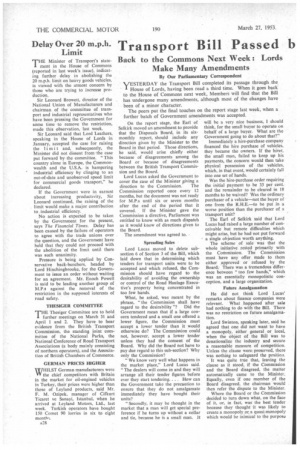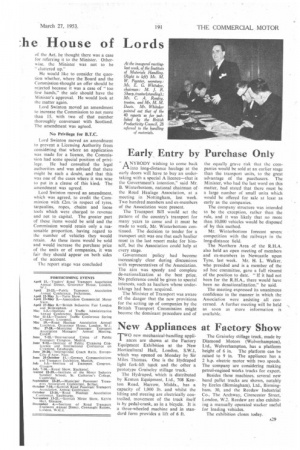Transport Bill Passed b he House of Lords
Page 30

Page 31

If you've noticed an error in this article please click here to report it so we can fix it.
Back to the Commons Next Week : Lords Make Many Amendments
By Our Parliamentary Correspondent VESTERDAY the Transport Bill completed its passage through the I House of Lords, having been read a third time. When it goes back to the House of Commons next week, Members will find that the Bill has undergone many amendments, although most of the changes have been of a minor character.
The peers put the final touches on the report stage last week, when a further batch of Government amendments was accepted.
On the report stage, the Earl of Selkirk moved an amendment to provide that the Disposals Board, in its sixmonthly report, should include any direction given by the Minister to the Board in that period. Those directions, he said, would arise chiefly either because of disagreements among the Board or because of disagreements between the British Transport Commission and the Board.
Lord Lucas asked the Government to cover the case of the Minister giving a direction to the Commission. The Commission reported once every 12 months, but the document was not ready for M.P.s until six or seven months after the end of the period that it covered. If the Minister gave the Commission a directive, Parliament was entitled to know with as much dispatch as it would know of directions given to the Board.
The amendment was agreed to. • Spreading Sales
Lord Lucas moved to delete subsection 6 of Section 3 of the Bill, which laid down that in determining which tenders for transport units were to be accepted and which refused, the Commission should have regard to the desirability of avoiding the ownership or control of the Road Haulage Executive's property being concentrated in too few hands.
What, he asked, was meant by the phrase, "the Commission shall have regard to the desirability "? Did the Government mean that if a large concern tendered and a small one offered a lower figure, the Commission must accept a lower tender than it would otherwise do? The Commission could not, however, accept a lower tender unless they had the consent of the Board. Why did the Board not have to pay due regard to this sub-section? Why only the Commission?
"We know very well what happens in the market place," Lord Lucas said. "The dealers will come in and they will arrange all their tender figures before ever they start tendering.... How can the Government take the precaution to ensure that they do not amalgamate immediately they have bought their units?
"Secondly, it may be thought in the market that a man will get special preference if he turns up without a collar and tie, because he is a small man. It will be a very nice business, I should think, for the small buyer to operate on behalf of a large buyer. What are the Government going to do about that?"
Immediately a hire-purchase company financed the hire purchase of vehicles, they became the owners. If the hirer, the small man, failed to keep up his payments, the concern would then take physical possession of the vehicles, which, in that event, would certainly fall into one set of hands.
Was the hire-purchase order requiring the initial payment to be 33 per cent. and the remainder to be cleared in 18 months to be waived? Was the ordinary purchaser of a vehicle—not the buyer of one from the R.H.E.—to he put in a worse position than the purchaser of a transport unit?
The Earl of Selkirk said that Lord Lucas had raised a large number of conceivable but remote difficulties which might arise, but he had not put forward a single objection worth anything.
The scheme of sale was that the whole initiative rested primarily with the Commission. The Commission must have any offer made to them either approved or refused by the Board. There was a tremendous difference between " too few hands," which was an essentially monopolistic conception, and a large organization.
Future Amalgamation He did not think Lord Lucas' remarks about finance companies were relevant. What happened after sale had nothing to do with the Bill. There was no restriction on future amalgamation.
Lord Swinton, speaking later, said he agreed that one did not want to have a monopoly, either general or local, when the object of the Bill was to denationalize the industry and secure a reasonable measure of competition. Unless the clause were preserved, there was nothing to safeguard the position.
It was quite true that, leaving the clause as it stood, if the Commission and the Board disagreed, the matter automatically came to the Minister. Equally, even if one member of the Board disagreed, the chairman would . then refer the dispute to the Minister.
Where the Board or the Commission decided to turn down what, on the face of it, or, in fact, was the best tender because they thought it was likely to create a monopoly or a quasi-monopoly which would be inimical to the purpoau of the Act, he thought there was a case for referring it to the Minister. Otherwise. the Minister was not to be "cluttered up."
He would like to consider the question whether, where the Board and the Commission.shought an offer should be rejected because it was a case of "too few hands," the sale should have the Minister's approval. He would look at the matter again.
Lord Swinton moved an amendment to increase the Commission to not more than 15, with two of that number thoroughly conversant with Scotland. The amendment was agreed.
No Privilege for B.T.C.
Lord Swinton moved an amendment to prevent a Licensing Authority from considering that where an application was made for a licence, the Commission had some special position of privilege. He had consulted the legal authorities and was advised that there might be such a doubt, and that this was one of the eases where it was wise to put in a clause of this kind. The amendment was agreed.
Lord Swinton moved an amendment, which was agreed, to credit the-Commission with £2m. .in respect of tyres, tarpaulins, ropes, chains and loose tools which were charged to revenue and not to capital. The greater part of these items would be sold and the Commission would retain only a reasonable proportion, having regard to the number of vehicles they would retain. As these items would be sold and would increase the purchase price of the units or of companies, it was fair they should appear on both sides of the account.
The report stage was concluded




















































































